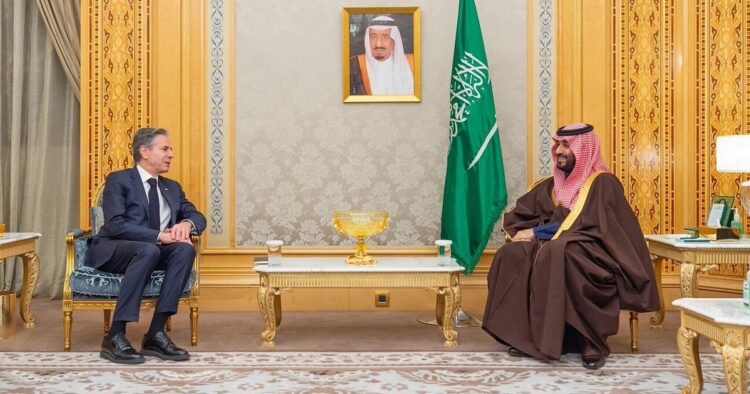Saudi Arabia’s foreign ministry issued a strong statement on Tuesday, disagreeing with a remark made by US National Security Council spokesman John Kirby. Kirby’s comment suggested that Saudi Arabia was ready to normalize relations with Israel before a ceasefire in Gaza and without progress toward Palestinian statehood.
During a press briefing, Kirby was asked if securing a hostage deal and normalization with Saudi Arabia were part of the same US effort. Kirby stated that they are separate issues but acknowledged positive discussions with Saudi Arabia both before and after October 7.
Saudi officials have openly expressed willingness to normalize relations with Israel but emphasized the need for a ceasefire in Gaza and progress toward a Palestinian state, echoing US Secretary of State Antony Blinken’s stance.
The Saudi foreign ministry’s statement challenged Kirby’s suggestion and reaffirmed Saudi Arabia’s steadfast position on the Palestinian issue. It insisted that diplomatic ties with Israel would only happen if an independent Palestinian state, with East Jerusalem as its capital on the 1967 borders, is recognized, and Israeli aggression in Gaza stops.
While Saudi Arabia has shifted from its previous demand for a fully implemented two-state solution as a precondition for normalization with Israel, it has not specified interim steps. Recognition of a Palestinian state on pre-1967 lines emerged as a detailed stipulation in the recent statement, avoiding a direct demand for Israel to recognize Palestine.
The statement directed the call for Palestinian state recognition at UN Security Council members, rather than Israel, suggesting an alternative route to circumvent Israel’s rejection of a two-state solution.
The timing of the statement, following a meeting between Blinken and Saudi Crown Prince Mohammed bin Salman, indicates possible disagreement between the two parties.
It comes amid discussions about recognizing an independent Palestinian state by the UK and the US, potentially signaling a shift in their longstanding position.
Blinken is scheduled to meet with Israeli officials following Hamas’s response to a hostage deal proposed by Qatar, which maintains its demand for a permanent ceasefire. This demand conflicts with Israel’s vow to dismantle Hamas, highlighting ongoing challenges in the region.
Blinken’s visit marks his fifth diplomatic tour since the start of the conflict, which erupted due to Hamas’s terror onslaught that killed 1,200 Israelis and another 253 people taken hostage.

















Comments